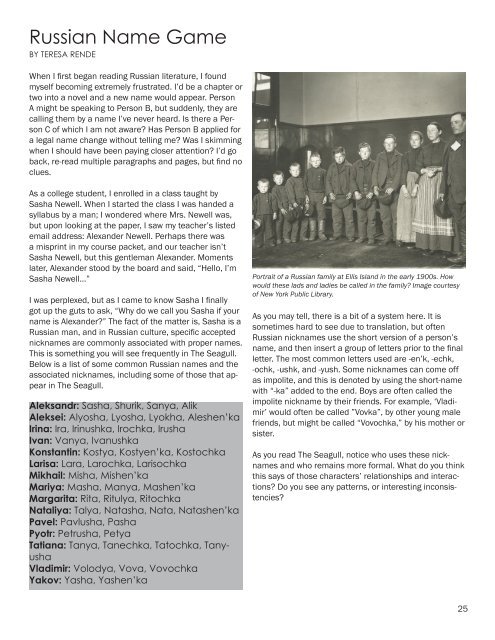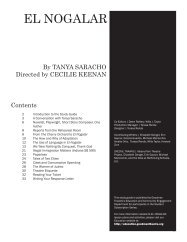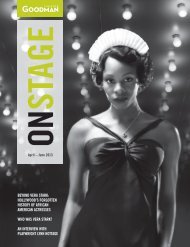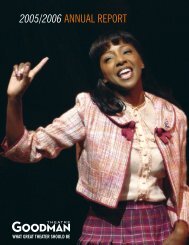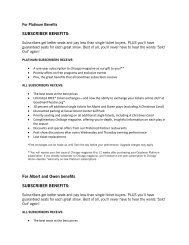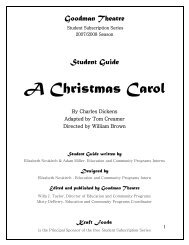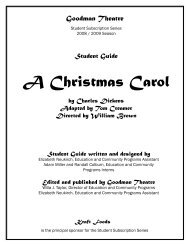The Seagull Study Guide (12MB) - Goodman Theatre
The Seagull Study Guide (12MB) - Goodman Theatre
The Seagull Study Guide (12MB) - Goodman Theatre
You also want an ePaper? Increase the reach of your titles
YUMPU automatically turns print PDFs into web optimized ePapers that Google loves.
Russian Name Game<br />
BY TERESA RENDE<br />
When I first began reading Russian literature, I found<br />
myself becoming extremely frustrated. I’d be a chapter or<br />
two into a novel and a new name would appear. Person<br />
A might be speaking to Person B, but suddenly, they are<br />
calling them by a name I’ve never heard. Is there a Person<br />
C of which I am not aware? Has Person B applied for<br />
a legal name change without telling me? Was I skimming<br />
when I should have been paying closer attention? I’d go<br />
back, re-read multiple paragraphs and pages, but find no<br />
clues.<br />
As a college student, I enrolled in a class taught by<br />
Sasha Newell. When I started the class I was handed a<br />
syllabus by a man; I wondered where Mrs. Newell was,<br />
but upon looking at the paper, I saw my teacher’s listed<br />
email address: Alexander Newell. Perhaps there was<br />
a misprint in my course packet, and our teacher isn’t<br />
Sasha Newell, but this gentleman Alexander. Moments<br />
later, Alexander stood by the board and said, “Hello, I’m<br />
Sasha Newell…”<br />
I was perplexed, but as I came to know Sasha I finally<br />
got up the guts to ask, “Why do we call you Sasha if your<br />
name is Alexander?” <strong>The</strong> fact of the matter is, Sasha is a<br />
Russian man, and in Russian culture, specific accepted<br />
nicknames are commonly associated with proper names.<br />
This is something you will see frequently in <strong>The</strong> <strong>Seagull</strong>.<br />
Below is a list of some common Russian names and the<br />
associated nicknames, including some of those that appear<br />
in <strong>The</strong> <strong>Seagull</strong>.<br />
Aleksandr: Sasha, Shurik, Sanya, Alik<br />
Aleksei: Alyosha, Lyosha, Lyokha, Aleshen’ka<br />
Irina: Ira, Irinushka, Irochka, Irusha<br />
Ivan: Vanya, Ivanushka<br />
Konstantin: Kostya, Kostyen’ka, Kostochka<br />
Larisa: Lara, Larochka, Larisochka<br />
Mikhail: Misha, Mishen’ka<br />
Mariya: Masha, Manya, Mashen’ka<br />
Margarita: Rita, Ritulya, Ritochka<br />
Nataliya: Talya, Natasha, Nata, Natashen’ka<br />
Pavel: Pavlusha, Pasha<br />
Pyotr: Petrusha, Petya<br />
Tatiana: Tanya, Tanechka, Tatochka, Tanyusha<br />
Vladimir: Volodya, Vova, Vovochka<br />
Yakov: Yasha, Yashen’ka<br />
Portrait of a Russian family at Ellis Island in the early 1900s. How<br />
would these lads and ladies be called in the family? Image courtesy<br />
of New York Public Library.<br />
As you may tell, there is a bit of a system here. It is<br />
sometimes hard to see due to translation, but often<br />
Russian nicknames use the short version of a person’s<br />
name, and then insert a group of letters prior to the final<br />
letter. <strong>The</strong> most common letters used are -en’k, -echk,<br />
-ochk, -ushk, and -yush. Some nicknames can come off<br />
as impolite, and this is denoted by using the short-name<br />
with “-ka” added to the end. Boys are often called the<br />
impolite nickname by their friends. For example, ‘Vladimir’<br />
would often be called ”Vovka”, by other young male<br />
friends, but might be called “Vovochka,” by his mother or<br />
sister.<br />
As you read <strong>The</strong> <strong>Seagull</strong>, notice who uses these nicknames<br />
and who remains more formal. What do you think<br />
this says of those characters’ relationships and interactions?<br />
Do you see any patterns, or interesting inconsistencies?<br />
25


